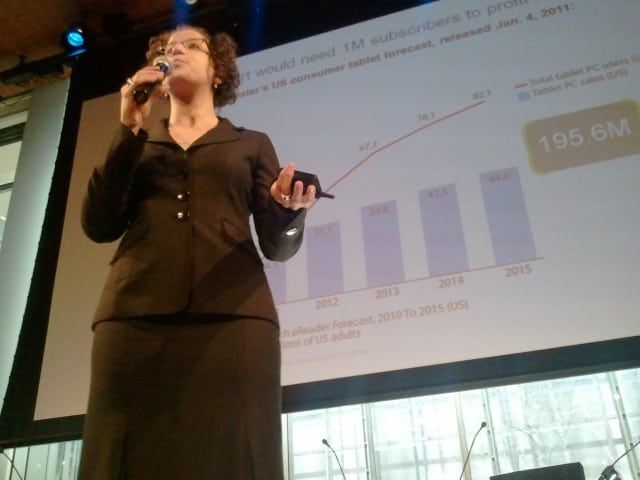
Kicking off our paidContent 2011 conference at the Times Center on a beautiful spring morning, Forrester senior analyst Sarah Rotman Epps threw the tablet opportunity in to sharp relief for media owners…
Don’t over-invest
“Many media companies have over-invested in these devices. It might not be realistic to have huge, huge investment in this market,” Epps said in a morning address.
“This is a big market. But, to recoup the return on investment of the scale The Daily is putting out there, for example, Rupert would need something like a million subscribers to cope with that.
“Even the very successful magazine apps, the numbers are in the thousands, not the tens of thousands or millions. It’s important to bring back to your firms tomorrow some realism about the scale of investment. Over-investment is particularly painful when your business model doesn’t mesh with Apple’s…”
March to Apple’s drumbeat
In the wake of Apple’s controversial recent subscription announcement and, having spoken with Apple (NSDQ: AAPL) product marketing SVP Phil Schiller at Wednesday’s iPad 2 event, Epps shared with us her conclusion: “Apple’s prospect (to publishers) is, ‘you don’t really need this data, you have plenty of other data you can use’. They’re trying to protect their ecosystem and give a clean experience to users.”
Epps suggested the companies which succeed on iOS devices are probably the new ones, able to script a business, from scratch, specifically for the new rules. “Innovation is coming from companies that have no legacy business model to defend,” she said. “Trying to force a legacy model on to this device when Apple’s model doesn’t work like that is going to become especially painful.”
In that regard, what works? Epps cited the surprising example of Splashtop, a freemium iPad remote desktop app whose publisher stretches its premium price “dynamically” between $1.99 and $9.99. “They realised, the more frequently they change the price of the app, the better it sells, because there are these app deals websites that tell people, ‘There’s a deal on Splashtop today.”
iPad imitators are failing
Epps acknowledged the coming wave of Android and other tablets, which “will offer publishers a lot more flexibility over their monetization models and customer data”.
“However – we see solid products with fatally flawed product strategies – products that are priced too high, relying too much on carriers for pricing and distribution strategy and are not radically diff enough to grab significant market share this year.”
Though she did not namecheck Samsung’s first-generation Galaxy Tab, Epps said smaller-screen, Froyo-based tablets “have failed because they had the wrong price and had an inferior OS – they felt like big expensive smartphones, because they were”. From Forrester research: “(Only) 12 percent of consumers are considering buying a tablet where the ability to hold it in one hand is an important feature.”
What about the likes of Motorola (NYSE: MMI) Xoom? “These are nice products – they’re way too expensive. It’s not a forgone conclusion that consumers want these devices anyway. Only nine percent of consumers say they would prefer Android or Google (NSDQ: GOOG) (over others).” Here’s a surprise – “Forty-six percent of consumers considering buying a tablet say they want Windows on that device.
“The Xoom is a more expensive device to make than the iPad, (but) Forrester’s data shows that consumers assign more value to Apple products because of the human factor. They’ re doing this mental math that says, ‘If I buy this product, I am confident I can go to a real store and speak to someone and can get help with it. That has monetary value.”
Best of the rest
RIM’s Playbook: “They have a marketing problem. This is a device that appeals, at most, to a large and shrinking consumer base. In our surveys, RIM (NSDQ: RIMM) and BlackBerry ranks last for developers.”
HP’s TouchPad: “Really interesting. HP (NYSE: HPQ) has wide brand strength for consumers but nobody knows what WebOS is. I really do think this is going to be a wildcard for consumers, we don’t know how well it’s going to sell.”
“It would be very easy to call this game for Apple before the second innings starts but, actually, we don’t think that’s what’s going to happen. This market is ripe for disruption by a number of different companies” – namely, Amazon (NSDQ: AMZN), Sony (NYSE: SNE), Vizio and Microsoft.
Walk, don’t run
“There are a lot of companies, we haven’t really heard yet what they’re strategy will be. “We’re sill in early innings here. But there are some conclusions you can make at this early stage…
“1. Embrace new business models.
“2. Don’t over-invest in apps – that market will reach $8bn on tablets alone by 2015.
“3. Don’t ignore the browser.
“4. Prioitise apps in this order – iOS, HP, Android, RIM.
“I honestly don’t think there is a rush to be on Android – you have the luxury of waiting.”
@ pC2011: How The New Tablets Will Change Your Content Strategy http://d1.scribdassets.com/ScribdViewer.swf?document_id=49946018&access_key=key-h5x7qdxyr77bgqxzprq&page=1&viewMode=list